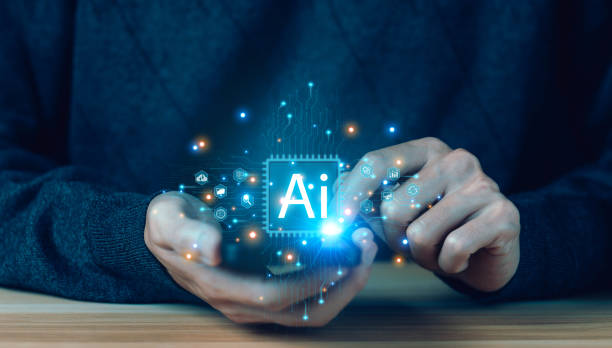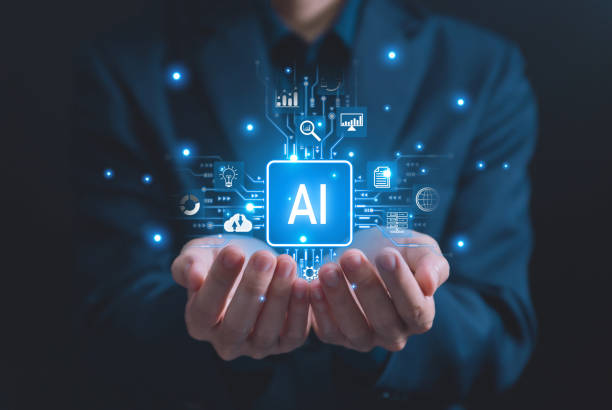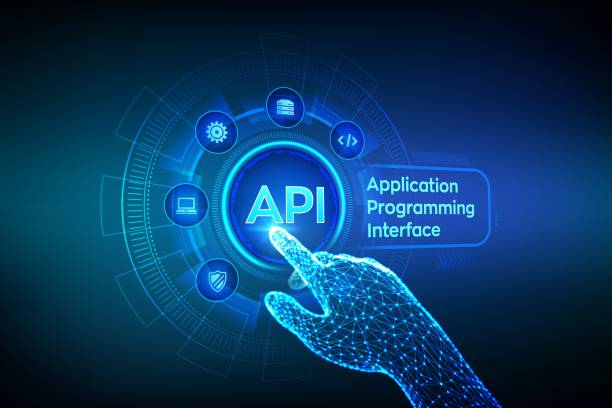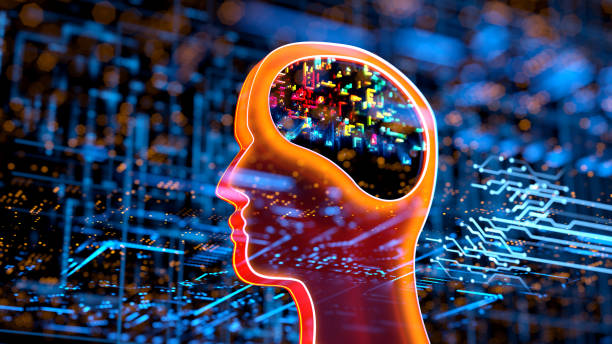What is Artificial Intelligence? Definitions, History, and Basic Concepts

Artificial Intelligence (#AI) is a branch of computer science that deals with building machines that can perform tasks that usually require human intelligence.
These tasks include learning, problem-solving, pattern recognition, reasoning, and decision-making.
The history of artificial intelligence dates back to the 1950s, and since then, significant progress has been made in this field.
Artificial intelligence is no longer just a theoretical concept and has widespread applications in various industries today.
To better understand artificial intelligence, it is essential to be familiar with basic concepts such as machine learning, neural networks, and natural language processing.
Machine Learning allows machines to learn from data without explicit programming.
Neural Networks are computational models inspired by the structure of the human brain and are used for pattern recognition and complex learning.
Natural Language Processing enables machines to understand and process human language.
Artificial intelligence (Wikipedia Artificial Intelligence), by combining these concepts, can increasingly play a role in our daily lives.
The development of artificial intelligence makes it possible to build systems that are not only more efficient but also capable of solving more complex problems.
Are you falling behind in the competition with large online stores?
Rasaweb brings your business online with professional e-commerce website design, increasing your market share!
✅ Increase brand credibility and customer trust
✅ Easy shopping experience leads to more sales
⚡ Act now to receive free website design consultation!
Types of Artificial Intelligence Classified by Capabilities and Applications

Artificial intelligence can be divided into different categories based on capabilities and applications.
One of the most common classifications is dividing artificial intelligence into Narrow AI and General AI.
Narrow AI is designed to perform specific tasks and performs very well in that task, but it cannot perform other tasks.
Examples of narrow AI include movie recommendation systems, facial recognition, and self-driving cars.
In contrast, General AI aims to create machines that can perform any task that a human can perform.
General AI is still in the theoretical stage and has not yet been fully realized.
Another classification is based on applications.
For example, artificial intelligence has widespread applications in areas such as medicine (disease diagnosis, drug development), finance (fraud detection, risk management), transportation (self-driving cars, traffic management), and manufacturing (automation, quality control).
With the advancement of technology, artificial intelligence is expected to play a more important role in our lives and help solve many of the existing challenges.
The potential of #artificial_intelligence to transform industries and improve human lives is immense.
In fact, many companies are investing heavily in artificial intelligence to gain a competitive advantage.
Machine Learning and Neural Networks are the Foundation of Artificial Intelligence

Machine learning is one of the main sub-branches of artificial intelligence that allows machines to learn from data without explicit programming.
Machine learning algorithms analyze data to identify patterns and relationships within them, and use these patterns for prediction or decision-making.
Neural networks are computational models inspired by the structure of the human brain and are very suitable for complex learning and pattern recognition.
Neural networks consist of multiple layers of interconnected nodes, each node being a simple processing unit.
These nodes transfer information to each other through connections, and by adjusting the weight of these connections, the neural network learns.
Machine learning and neural networks play a key role in many artificial intelligence applications.
For example, in facial recognition, a neural network is trained using many images of different faces and can then recognize new faces.
In movie recommendation systems, machine learning algorithms analyze users’ movie watching history to suggest movies that they are likely to enjoy.
Machine learning and neural networks, with their increasing advancements, help create smarter and more efficient systems.
In fact, these technologies are transforming the way we interact with computers and smart devices.
| Machine Learning Algorithm | Application |
|---|---|
| Linear Regression | Predicting housing prices |
| Decision Tree | Disease Diagnosis |
| Support Vector Machine | Image Recognition |
Applications of Artificial Intelligence in Various Industries

Artificial intelligence has widespread applications in various industries and is transforming the way things are done.
In medicine, artificial intelligence is used for disease diagnosis, drug development, and personalized treatment.
For example, artificial intelligence algorithms can analyze medical images such as MRI and CT scans and diagnose diseases more accurately than doctors.
In finance, artificial intelligence is used for fraud detection, risk management, and investment optimization.
Artificial intelligence systems can automatically monitor financial transactions and identify suspicious transactions.
In transportation, artificial intelligence is used for self-driving cars, traffic management, and route optimization.
Self-driving cars can drive without human intervention and help reduce accidents and improve transportation efficiency.
In manufacturing, artificial intelligence is used for automation, quality control, and process optimization.
Artificial intelligence systems can automatically control production lines and identify product defects.
These applications are just examples of the widespread applications of #artificial_intelligence in various industries.
Artificial intelligence is constantly advancing and is expected to play an increasingly important role in our lives in the future.
Did you know that customers’ first impression of your company is your website? Multiply your business credibility with a powerful corporate website from Rasaweb!
✅ Exclusive and eye-catching design tailored to your brand
✅ Improved user experience and increased customer acquisition
⚡ Get a free consultation to start!
The Future of Artificial Intelligence: Opportunities and Challenges

The future of artificial intelligence is full of opportunities and challenges.
On the one hand, artificial intelligence can help solve many of the world’s existing challenges, such as climate change, disease, and poverty.
Artificial intelligence can help us develop renewable energy, detect diseases early, and improve agricultural productivity.
On the other hand, artificial intelligence also poses challenges, such as job loss, increased inequality, and misuse of technology.
Automation caused by artificial intelligence can lead to job losses in some industries, and if not managed properly, it can increase inequality.
Also, artificial intelligence can be used for malicious purposes such as building automated weapons and espionage.
To benefit from the opportunities of artificial intelligence and reduce its challenges, it is necessary to develop this technology responsibly and ethically.
It is necessary to establish appropriate laws and regulations for the use of artificial intelligence and ensure that this technology is used for the benefit of all members of society.
Artificial intelligence has great potential to improve human lives, but to realize this potential, it is necessary to develop this technology carefully and responsibly.
The Impact of Artificial Intelligence on Our Daily Lives

Artificial intelligence is increasingly impacting our daily lives, even if we don’t realize it.
The movie and music recommendation systems we use, voice assistants like Siri and Alexa, and email spam filters all use artificial intelligence.
Artificial intelligence is changing the way we interact with computers and smart devices.
Instead of giving computers explicit commands, we can talk to them in natural language and ask them to do our tasks.
Artificial intelligence is also changing the way we work.
Many repetitive and tedious tasks can be automated using artificial intelligence, allowing us to focus on more creative and important tasks.
Artificial intelligence is also changing the way we learn.
Artificial intelligence-based education systems can help us learn in a personalized way and at our own pace.
Artificial intelligence is also changing the way we take care of our health.
Wearable devices and mobile applications based on artificial intelligence can help us track our health and detect diseases early.
The impact of artificial intelligence on our daily lives is increasing day by day.
Artificial intelligence has become an integral part of our lives and is expected to play an increasingly important role in our lives in the future.
Ethics in Artificial Intelligence: Important Considerations
![]()
With the increasing applications of artificial intelligence, ethical considerations related to this technology are becoming more important.
One of the most important ethical considerations is discrimination.
Artificial intelligence algorithms can be unintentionally discriminatory if they are trained on data that contains biases.
For example, a facial recognition algorithm may perform worse at recognizing the faces of people with dark skin tones if it is trained on data that mostly includes the faces of people with light skin tones.
Another ethical consideration is privacy.
Artificial intelligence systems often need to collect and analyze large amounts of personal data, which can create concerns about privacy.
It is necessary to establish appropriate laws and regulations for the collection and use of personal data and ensure that the privacy of individuals is protected.
A third ethical consideration is accountability.
If an artificial intelligence system makes a mistake and causes harm, who is responsible? Is it the system manufacturer or the system user? It is necessary to consider appropriate mechanisms for accountability and ensure that in the event of an error, injured parties can be compensated.
Artificial intelligence should be developed and used ethically to benefit all members of society.
| Ethical Issue | Description |
|---|---|
| Discrimination | Algorithms can be unintentionally discriminatory |
| Privacy | Collection and use of personal data |
| Accountability | Who is responsible for AI errors? |
How to Learn Artificial Intelligence: Educational Resources and Paths

If you are interested in learning artificial intelligence, there are a variety of educational resources and paths available to you.
You can increase your knowledge in this field by participating in online or in-person courses, reading books and articles, and doing practical projects.
Many reputable universities and educational institutions offer artificial intelligence courses.
Also, online educational websites and platforms such as Coursera, edX, and Udacity offer online artificial intelligence courses that you can use.
In addition to courses and training, you can deepen your knowledge in the field of artificial intelligence by reading books and scientific articles.
Reputable scientific journals such as IEEE Transactions on Pattern Analysis and Machine Intelligence and Journal of Machine Learning Research publish new research articles in the field of artificial intelligence.
Also, you can get to know experts in the field and stay informed about the latest advances in this field by participating in artificial intelligence conferences and workshops.
For learning artificial intelligence, perseverance and continuous practice are essential.
By practicing and doing practical projects, you can strengthen your skills in this area and become an artificial intelligence expert.
The development of artificial intelligence requires experts who have the necessary knowledge and skills.
Tired of missing business opportunities due to the lack of a professional corporate website? Don’t worry anymore! With Rasaweb’s corporate website design services:
✅ Your brand’s credibility and professionalism will increase.
✅ You will attract more customers and sales leads.
⚡ Get a free consultation to start now!
Key Tools for Artificial Intelligence Development

For the development of artificial intelligence, a variety of tools are available to developers.
These tools include programming languages, software libraries, and cloud platforms.
One of the most common programming languages for artificial intelligence development is Python.
Python is a popular choice for artificial intelligence developers due to its simplicity, readability, and powerful software libraries.
Software libraries such as TensorFlow, PyTorch, and Scikit-learn provide powerful tools for machine learning, neural networks, and natural language processing.
Cloud platforms such as Google Cloud AI Platform, Amazon SageMaker, and Microsoft Azure Machine Learning provide artificial intelligence development and deployment environments in the cloud.
These platforms allow developers to access powerful computing resources and advanced tools and quickly develop and deploy their artificial intelligence models.
Choosing the right tool for artificial intelligence development depends on the needs and requirements of your project.
Artificial intelligence requires the use of appropriate tools so that developers can make the best use of it and implement intelligent systems.
The use of these tools allows developers to design and implement artificial intelligence systems quickly and with high quality.
Challenges Facing Artificial Intelligence in Iran

Artificial intelligence in Iran faces numerous challenges.
One of the most important challenges is the shortage of specialized and trained workforce in this field.
For the development of artificial intelligence in Iran, more investment is needed in training and educating specialized workforce.
Another challenge is the lack of quality and accessible data.
Artificial intelligence algorithms need a lot of data to learn and improve their performance.
For the development of artificial intelligence in Iran, more data needs to be collected and made available, and the privacy of individuals needs to be protected.
A third challenge is the lack of investment in artificial intelligence research and development.
For the development of artificial intelligence in Iran, the government and the private sector need to invest more in research and development of this technology.
A fourth challenge is the lack of appropriate laws and regulations for the use of artificial intelligence.
For the responsible and ethical use of artificial intelligence in Iran, appropriate laws and regulations need to be established and ensure that this technology is used for the benefit of all members of society.
Despite these challenges, artificial intelligence in Iran has great potential for development and progress.
With the efforts and cooperation of the government, the private sector, and the scientific community, these challenges can be overcome and the opportunities of artificial intelligence can be used to the best advantage.
The development of artificial intelligence in Iran can lead to progress in various industries and improve the quality of life.
FAQ
| Question | Answer |
|---|---|
| 1. What is Artificial Intelligence (AI)? | It is a branch of computer science that aims to create machines capable of simulating human intelligence and performing tasks that require human thinking, such as learning, problem-solving, and decision-making. |
| 2. What are the main types of artificial intelligence? | They can be classified into Narrow AI, which focuses on a specific task, General AI, which possesses comprehensive human capabilities, and Super AI, which surpasses human intelligence. |
| 3. Mention some common applications of artificial intelligence in our daily lives. | These include voice assistants (such as Siri and Alexa), recommendation systems (such as Netflix and Amazon), self-driving cars, facial recognition systems, and spam filters. |
| 4. What is the difference between Artificial Intelligence and Machine Learning? | Artificial Intelligence is the broader concept of creating intelligent machines, while Machine Learning is a subset of Artificial Intelligence that focuses on enabling systems to learn from data without explicit programming. |
| 5. What is Deep Learning? | It is a subset of Machine Learning that uses multi-layered artificial neural networks (deep neural networks) to process data and discover complex patterns, and is used in image and speech recognition. |
| 6. What are the most prominent benefits of Artificial Intelligence? | Improving efficiency and productivity, automating repetitive tasks, making better decisions based on big data analysis, and developing solutions to complex problems in fields such as medicine and science. |
| 7. What are the main challenges facing the development and deployment of Artificial Intelligence? | These include the need for vast amounts of high-quality data, privacy and security issues, bias in data and algorithms, and high development and maintenance costs. |
| 8. Does Artificial Intelligence raise ethical or social concerns? | Yes, it raises concerns related to privacy, algorithmic bias, job loss due to automation, responsibility for errors made by intelligent systems, and the need for a regulatory framework. |
| 9. How can Artificial Intelligence affect the future of the labor market? | It can lead to the automation of some routine tasks, but it will also create new jobs that require advanced skills in developing, operating, and maintaining artificial intelligence systems. |
| 10. What are some modern or promising technologies in the field of Artificial Intelligence? | These include advanced Natural Language Processing (NLP) (such as large language models like ChatGPT), computer vision, robotics, and Generative AI. |
And other services of Rasa Web Advertising Agency in the field of advertising
Intelligent data analysis: a quick and efficient solution to increase click-through rate with a focus on marketing automation.
Intelligent sales automation: an effective tool for online growth by customizing the user experience.
Intelligent advertising campaign: a new service to increase sales through intelligent data analysis.
Intelligent content strategy: Transform the click-through rate with the help of attractive user interface design.
Intelligent advertising campaign: a new service to increase website visits by optimizing key pages.
And more than hundreds of other services in the field of internet advertising, advertising consulting and organizational solutions
Internet Advertising | Advertising Strategy | Advertorial
Resources
What is artificial intelligence and how does it work?
,What is Artificial Intelligence (AI)? Introducing types, applications and its future
,Artificial intelligence on Wikipedia
,Video: What is artificial intelligence?
? Are you ready to shine and grow sustainably in the digital world? Rasaweb Digital Marketing Agency, with its expertise in providing comprehensive services including SEO-optimized website design, search engine optimization (SEO), and targeted advertising campaigns, is your trusted partner on the path to online success.
📍 Tehran, Mirdamad Street, next to the Central Bank, South Kazerun Alley, Ramin Alley, No. 6




